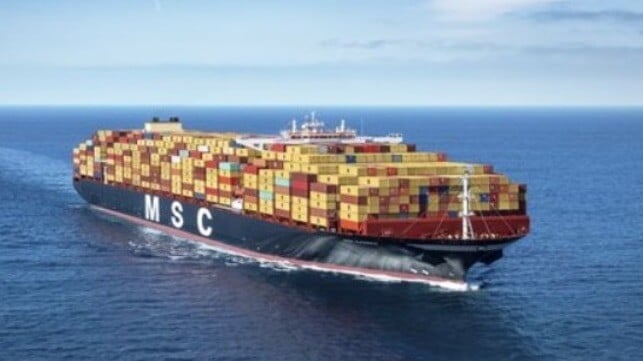MSC Ordered to Pay $1M in Default Judgement on Shipper's Complaint

An administrate law judge ruled on January 13 that Mediterranean Shipping Company (MSC) must pay a shipper nearly $1 million because it failed to produce discovery documents in a 2020 complaint filed by a furniture company headquartered in Pennsylvania alleging violations of the Shipping Act by MSC and COSCO. MSC has up to 22 days to file an exception to the initial decision or it will become the final decision of the Federal Maritime Commission (FMC).
Chief Administrative Law Judge Erin Wirth writes in the initial decision that they are imposing a default decision against MSC for “failing to produce discovery,” highlighting that the court had compelled the shipping company as early as December 2021 to provide the requested documents requested by the shipper, MCS Industries. The judge highlights that MSC had been warned multiple times that if it failed to produce the materials a default judgment would be issued.
“This decision does not reach the merits of the claim, but rather imposes default as a procedural consequence,” writes Judge Wirth in the initial decision.
MSC has repeatedly argued that it has acted in good faith but that it is limited by Swiss law, where the shipping line is incorporated, as to some of the material it can provide during discovery without risking criminal sanctions in Switzerland. MCS filed with the Swiss authorities which denied the request for the materials because the proceeding was administrative and therefore “does not fall within the scope of the application of the Hague Convention,” which the carrier contends limited its ability to provide documents. MSC received a later ruling from the Swiss Federal Department of Justice and Police that the Hague Evidence Convention Procedures applied in the case.
The shipper in its complaint to the FMC alleged that MSC and COSCO had conspired to deny service. The complaint was amended after COSCO settled with the shipper while MSC continued to strong refute all the charges. The furniture company contended that the carriers blanked sailings to create an artificial scarcity, which propped up spot prices for containers early in the pandemic and then lead to the surge in pricing and lack of capacity. Like many shippers, MCS said it had been forced into the spot market despite its contracts to move containers from Asia to the U.S.
MSC in its response provided copies of notices to the market of sailings from Tianjin and Qingdao that were blanked due to port congestion or other factors that MSC said were outside its control. Judge Wirth found that MSC did not provide documents and communications that would show why sailings were voided or canceled. She writes in the initial decision, “MSC cannot limit its discovery to what it believes should be the core issues…” saying the company improperly limited its production to only documents concerning bookings and attempted bookings.
While MSC argued that it continues to work in good faith to try to resolve the impasse created by the Geneva court ruling, Judge Wirth found it in default. MCS Industries was seeking reparations equaling amounts in excess of its service contract rates with MSC and what it spent on the spot market. The company sought $480,719 for 2020-2021 and an additional $463,936 for the first three months of the 2021-2022 shipping year. The judge ordered that MSC should pay the full amount of $944,655 plus interest from July 31, 2021.

that matters most
Get the latest maritime news delivered to your inbox daily.
A further claim for $651,304 in attorney fees, costs, and expenses was however found to be premature and denied in the initial order. MCS argues that its attorney fees were “exacerbated by MSC’s discovery misconduct.” Judge Wirth notes in the initial decision that the FMC rules state that a petition for the attorney fees has to be made 30 days after a decision becomes final, leaving the opportunity for MCS to seek the recovery of the attorney fees in the future.
Because no findings were made on the merits of the complaint, a cease and desist order was not issued to MSC. This complaint is just one of several filed by different shippers against the major carriers each alleging similar actions of denying service under their contracts and forcing them into the spot market at greatly inflated prices for transportation of their containers.
